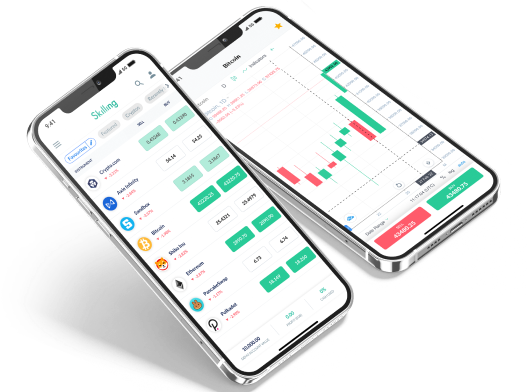

Financial technology (also known as fintech) is a term used to describe the new technology and innovations that are changing how we handle money. It covers everything from mobile apps that help you budget to platforms for trading stocks and cryptocurrencies. But what exactly is fintech, and how does it work?
Experience Skilling's award-winning platform
Try out any of Skilling’s trading platforms on the device of your choice across web, android or iOS.

Fintech meaning
Fintech uses technology to make financial services faster, cheaper, and easier. For example, fintech apps can help you transfer money, track your spending, or invest in the stock market without needing to visit a bank or a financial advisor. In simple terms, fintech makes managing your money more accessible and convenient using technology.
Examples of fintech
1. Mobile banking apps
Apps like Chime and Revolut allow you to manage your bank account from your smartphone. You can check balances, transfer money, and pay bills without visiting a bank branch.
2. Payment apps
PayPal and Venmo are widely used for sending money to friends or paying for goods and services online. They make transactions simple and secure, and you can connect these apps to your bank account or credit card.
3. Investment and trading platforms
Platforms like Skilling offer CFD (Contract for Difference) trading, allowing you to buy and sell stocks, cryptocurrencies, and other financial instruments from your phone or computer. These services often offer low fees and easy-to-use interfaces for both beginners and experienced investors and traders.
4. Cryptocurrency exchanges
Coinbase and Binance are examples of platforms where you can buy, sell, and trade cryptocurrencies like Bitcoin, Ethereum, and more. These exchanges make it easy to enter the world of digital currencies.
5. Peer-to-Peer lending
Services like LendingClub and Prosper connect individuals who need loans with people who have money to lend. This direct lending model often offers better rates for borrowers and returns for lenders compared to traditional banks.
6. Robo-Advisors
Betterment and Wealthfront are robo-advisors that use algorithms to manage your investments. You answer a few questions about your goals and risk tolerance, and the robo-advisor creates and manages an investment portfolio for you.
7. Digital Wallets
Apple Pay and Google Wallet let you store your credit and debit cards digitally. You can make payments with just your phone or smartwatch, which is fast and convenient.
8. Blockchain Technology
Ethereum and Polkadot are platforms that use blockchain technology for more than just cryptocurrencies. They enable smart contracts and decentralized applications (dApps) for a variety of uses, from finance to gaming.
9. Crowdfunding Platforms
Kickstarter and GoFundMe are platforms where people can raise money for new projects or causes. They allow individuals and businesses to get funding from a large number of people through small contributions.
Top 5 Fintech companies to trade
1. Visa Inc. (V)
Current market cap as of July 14, 2024: $531.74 billion
Visa is a global leader in digital payments and credit card services. It provides a secure and reliable platform for millions of transactions every day.
With a current market cap of $531.74 billion, Visa is a dominant player in the fintech space. Its extensive global reach and innovative payment technologies, like contactless payments and fraud protection, make it a strong choice for traders seeking stability and growth in the digital payments sector.
2. Mastercard Incorporated (MA)
Current market cap as of July 14, 2024: $409.13 billion
Mastercard offers a wide range of payment solutions, including credit, debit, and prepaid cards. It is known for its advanced payment technologies and global transaction network.
With a market cap of $409.13 billion, Mastercard’s robust financial services and focus on innovation, such as blockchain technology and secure digital payments, position it well for future growth.
3. PayPal Holdings, Inc. (PYPL)
Current market cap as of July 14, 2024: $63.05 billion
PayPal is a leading online payment platform that offers services for personal transactions, online shopping, and business payments.
With a market cap of $63.05 billion, PayPal’s established brand, wide user base, and continuous expansion into new financial services make it an attractive option for investors.
4. Square, Inc. (Block, Inc.) (SQ)
Current market cap as of July 14, 2024: $42.48 billion
Square, now known as Block, Inc., offers a variety of financial services including point-of-sale systems, payment processing, and personal finance management through Cash App.
With a market cap of $42.48 billion, Block’s innovative approach to payments and financial services, along with its expanding product portfolio, offers significant growth potential for traders.
5. Robinhood Markets, Inc. (HOOD)
Current market cap as of July 14, 2024: $19.58 billion
Robinhood is known for its commission-free trading platform that offers stocks, options, and cryptocurrencies to retail investors.
With a market cap of $19.58 billion, Robinhood’s strong presence in the retail trading market, combined with its user-friendly app and expanding financial services, makes it a compelling choice for investors.
Pros and cons of trading fintech
| Pros | Cons |
|---|---|
| High growth potential: Fintech companies often operate in rapidly expanding markets, providing significant growth opportunities. | High volatility: The fintech sector can be highly volatile, with stock prices subject to rapid changes due to market sentiment and technological advancements. |
| Innovation: Fintech firms are at the forefront of technological advancements, potentially offering early access to groundbreaking innovations. | Regulatory risks: Fintech companies often face significant regulatory scrutiny, and changes in regulations could impact their operations and profitability. |
| Diverse opportunities: The sector includes a wide range of services, from payments and lending to blockchain and insurance technology, allowing for diversified investments. | Competition: The sector is highly competitive, with constant innovation required to stay ahead, which can strain resources and lead to market share loss. |
| Efficiency and convenience: Fintech solutions streamline financial transactions and services, enhancing user experience and operational efficiency. | Technological risks: Dependence on technology means fintech firms are vulnerable to cybersecurity threats, system failures, and technological obsolescence. |
| Disruptive impact: Fintech companies could disrupt traditional financial services, potentially leading to substantial market shifts and gains. | Uncertain profitability: Many fintech startups operate at a loss during their growth phases, making their long-term profitability uncertain and risky for investors. |

Summary
While fintech has transformed the financial industry with innovative solutions and new opportunities for both consumers and investors, it also comes with its own set of challenges. The sector's rapid growth offers exciting prospects for those looking to trade stocks, invest in new technologies, or explore advanced financial services. However, it’s important to navigate the volatility, regulatory risks, and cybersecurity concerns associated with fintech companies.
Source: Investopedia.com
Open a free Skilling trading account today and start exploring top global stocks, ETFs, commodities and cryptocurrencies with very low fees.
What better way to welcome you than with a bonus?
Start trading with a $30 bonus on your first deposit.
Terms and Conditions apply












